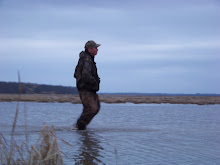"Fontenot, Calcasieu and a Revelation"
For the better part of two decades, Grandma took care of things back home while my grandfather served with the Air Force fighting two wars and, later, training to fight the Cold War. With virtually no help from anyone, she raised my mother and her sister into fine young ladies, moving them all over the country at the Air Force’s whim. By the time my grandma was my age, she’d bought and sold more homes and cars than I ever will, and infinitely more shrewdly than I can ever hope to as well.
So while nothing should surprise me about my grandmother’s capabilities and individuality, I was nonetheless taken aback a few months ago when the cover of an issue of Louisiana Sportsman which bore the words, “Rough-Weather Calcasieu Tactics” caught my mother’s eye.
“Oh, your grandma loved fishing Calcasieu,” she offered wistfully.
I must admit that at first I had some difficulty imagining my fiery and diminutive grandmother – who always kept an immaculate home and an even neater appearance – baiting a hook on a sultry west Louisiana day under a long-billed cap, with fish guts and mud under her fingernails.
“Oh, yeah, Grandma loved fishing,” allowed my mother, noticing my face as I processed what she’d told me.
It was 1955 or 1956. My mom was 10 or 11 and my aunt was a couple years older than that. They called Lake Charles home then; my grandfather navigated B-47s for the Strategic Air Command out of Lake Charles Air Force Base (later renamed in honor of Claire Chennault, of Flying Tigers fame).
As a captain, Grandpa was a member of the Lake Charles AFB Officers’ Club. The O-Club was always a very social place (to put it mildly), and, like any good officer and wife, Grandpa and Grandma spent a lot of time there. Over time, they befriended one of the bartenders, a Cajun named Fontenot. Somehow during the course of their interactions, the topic of fishing arose, and Fontenot allowed as how he had a pirogue and would be happy to take them fishing any time.
My grandparents would make the drive from the base out to Fontenot’s every few weekends or so when the fishing was good, and the three would go after speckled trout in and along the bayous off Calcasieu River and Lake Charles. Fontenot called my grandfather “Hebert” – a good-natured variation of his actual name, Herbert, and, according to my mother, my grandfather called Fontenot a damned fine fisherman.
Apparently, Grandma was quite the patient fisher and could sit there all day if she had to. She didn’t mind the alligators and the bugs and the heat – Grandpa would buy Punk skeeter coils from the New Moon Drive-In for their trips – and my mother recalls that she was quite matter-of-fact about baiting her own hook. Grandpa, on the other hand, liked the boating, the fish-cleaning and the macho stuff, but wasn’t all that patient a fisher himself.
So there they sat every few Saturdays, in Fontenot’s pirogue, learning how to catch the speckled trout of Calcasieu, at a time shortly before “Sportsman’s Paradise” graced the State’s license plates, when mostly only locals fished those waters. Grandma in her blouse and shorts, Grandpa in his khaki pants and white undershirt, a few Falstaffs sitting in the pirogue between them.
Every so often when I was a little boy, my grandmother would fish with me off a dock over a bayou near my childhood home in the Florida Panhandle. It was as low-tech as low-tech gets, what with the cut up hot dogs we used for bait. A mess of pinfish and the occasional catfish made for an exciting afternoon. Thinking back on those times all these many years later while my mother stood in my living room and described my grandmother’s love of fishing Calcasieu, it really made a lot of sense to me after all. Naturally, I wanted to hear more.
“I was only 10 or 11 at the time, so I don’t remember much today,” my mother offered. “It sounds weird, but I can vividly recall how a single drip of sweat would bead right on the end of her nose when she hung sheets on the clothes line in our back yard; she would have that same bead of sweat on her nose each time she and Grandpa came back from fishing. And I remember the trout were great eating. But mostly, I remember what a revelation it was to see how much my persnickety mother got into her fishing back then.”
A revelation indeed.
(c) Roger Guilian 2009

